59 start with K start with K
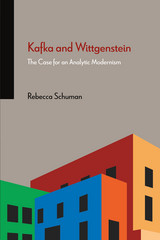
In Kafka and Wittgenstein, Rebecca Schuman undertakes the first ever book-length scholarly examination of Ludwig Wittgenstein’s philosophy of language alongside Franz Kafka’s prose fiction. In groundbreaking readings, she argues that although many readers of Kafka are searching for what his texts mean, in this search we are sorely mistaken. Instead, the problems and illusions we portend to uncover, the im-portant questions we attempt to answer—Is Josef K. guilty? If so, of what? What does Gregor Samsa’s transformed body mean? Is Land-Surveyor K. a real land surveyor?— themselves presuppose a bigger delusion: that such questions can be asked in the first place. Drawing deeply on the entire range of Wittgenstein’s writings, Schuman can-nily sheds new light on the enigmatic Kafka.
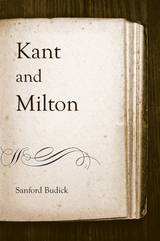
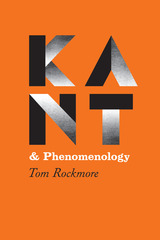
Phenomenology, together with Marxism, pragmatism, and analytic philosophy, dominated philosophy in the twentieth century—and Edmund Husserl is usually thought to have been the first to develop the concept. His views influenced a variety of important later thinkers, such as Heidegger and Merleau-Ponty, who eventually turned phenomenology away from questions of knowledge. But here Tom Rockmore argues for a return to phenomenology’s origins in epistemology, and he does so by locating its roots in the work of Immanuel Kant.
Kant and Phenomenology traces the formulation of Kant’s phenomenological approach back to the second edition of Kant’s Critique of Pure Reason. In response to various criticisms of the first edition, Kant more forcefully put forth a constructivist theory of knowledge. This shift in Kant’s thinking challenged the representational approach to epistemology, and it is this turn, Rockmore contends, that makes Kant the first great phenomenologist. He then follows this phenomenological line through the work of Kant’s idealist successors, Fichte and Hegel. Steeped in the sources and literature it examines, Kant and Phenomenology persuasively reshapes our conception of both of its main subjects.
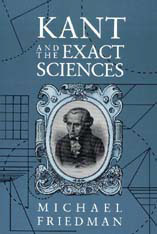
Kant sought throughout his life to provide a philosophy adequate to the sciences of his time—especially Euclidean geometry and Newtonian physics. In this new book, Michael Friedman argues that Kant’s continuing efforts to find a metaphysics that could provide a foundation for the sciences is of the utmost importance in understanding the development of his philosophical thought from its earliest beginnings in the thesis of 1747, through the Critique of Pure Reason, to his last unpublished writings in the Opus postumum.
Previous commentators on Kant have typically minimized these efforts because the sciences in question have since been outmoded. Friedman argues that, on the contrary, Kant’s philosophy is shaped by extraordinarily deep insight into the foundations of the exact sciences as he found them, and that this represents one of the greatest strengths of his philosophy. Friedman examines Kant’s engagement with geometry, arithmetic and algebra, the foundations of mechanics, and the law of gravitation in Part One. He then devotes Part Two to the Opus postumum, showing how Kant’s need to come to terms with developments in the physics of heat and in chemistry formed a primary motive for his projected Transition from the Metaphysical Foundations of Natural Science to Physics.
Kant and the Exact Sciences is a book of high scholarly achievement, argued with impressive power. It represents a great advance in our understanding of Kant’s philosophy of science.
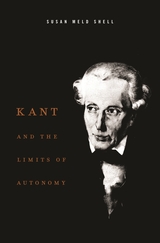
Autonomy for Kant is not just a synonym for the capacity to choose, whether simple or deliberative. It is what the word literally implies: the imposition of a law on one’s own authority and out of one’s own rational resources. In Kant and the Limits of Autonomy, Shell explores the limits of Kantian autonomy—both the force of its claims and the complications to which they give rise. Through a careful examination of major and minor works, Shell argues for the importance of attending to the difficulty inherent in autonomy and to the related resistance that in Kant’s view autonomy necessarily provokes in us. Such attention yields new access to Kant’s famous, and famously puzzling, Groundlaying of the Metaphysics of Morals. It also provides for a richer and more unified account of Kant’s later political and moral works; and it highlights the pertinence of some significant but neglected early writings, including the recently published Lectures on Anthropology.
Kant and the Limits of Autonomy is both a rigorous, philosophically and historically informed study of Kantian autonomy and an extended meditation on the foundation and limits of modern liberalism.
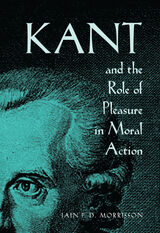
Kant scholars since the early nineteenth century have disaxadgreed about how to interpret his theory of moral motivation. Kant tells us that the feeling of respect is the incentive to moral action, but he is notoriously ambiguous on the question of what exactly this means. In Kant and the Role of Pleasure in Moral Action, Iain Morrisson offers a new view on Kant’s theory of moral action.
In a clear, straightforward style, Morrisson responds to the ongoing interpretive stalemate by taking an original approach to the problem. Whereas previous commentators have attempted to understand Kant’s feeling of respect by studying the relevant textual evidence in isolation, Morrisson illuminates this evidence by determining what Kant’s more general theory of action commits him to regarding moral action. After looking at how Kant’s treatment of desire and feeling can be reconciled with his famous account of free maxim-based action, Morrisson argues that respect moves us to moral action in a way that is structurally parallel to the way in which nonmoral pleasure motivates nonmoral action.
In reconstructing a unified theory of action in Kant, Morrisson integrates a number of distinct elements in his practical philosophy. Kant and the Role of Pleasure in Moral Action is part of a new wave of interest in Kant’s anthropological (that is, psychological) works.
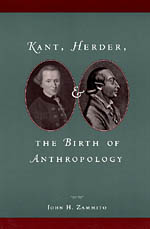
Relying on previously unexamined sources, Zammito traces Kant's friendship with Herder as well as the personal tensions that destroyed their relationship. From this he shows how two very different philosophers emerged from the same beginnings and how, because of Herder's reformulation of Kant, anthropology was born out of philosophy.
Shedding light on an overlooked period of philosophical development, this book is a major contribution to the history of philosophy and the social sciences, and especially to the history of anthropology.

From Kant to Kierkegaard, from Hegel to Heidegger, continental philosophers have indelibly shaped the trajectory of Western thought since the eighteenth century. Although much has been written about these monumental thinkers, students and scholars lack a definitive guide to the entire scope of the continental tradition. The most comprehensive reference work to date, this eight-volume History of Continental Philosophy will both encapsulate the subject and reorient our understanding of it. Beginning with an overview of Kant’s philosophy and its initial reception, the History traces the evolution of continental philosophy through major figures as well as movements such as existentialism, phenomenology, hermeneutics, and poststructuralism. The final volume outlines the current state of the field, bringing the work of both historical and modern thinkers to bear on such contemporary topics as feminism, globalization, and the environment. Throughout, the volumes examine important philosophical figures and developments in their historical, political, and cultural contexts.
The first reference of its kind, A History of Continental Philosophy has been written and edited by internationally recognized experts with a commitment to explaining complex thinkers, texts, and movements in rigorous yet jargon-free essays suitable for both undergraduates and seasoned specialists. These volumes also elucidate ongoing debates about the nature of continental and analytic philosophy, surveying the distinctive, sometimes overlapping characteristics and approaches of each tradition. Featuring helpful overviews of major topics and plotting road maps to their underlying contexts, A History of Continental Philosophy is destined to be the resource of first and last resort for students and scholars alike.

Kant on Causality, Freedom, and Objectivity was first published in 1984. Minnesota Archive Editions uses digital technology to make long-unavailable books once again accessible, and are published unaltered from the original University of Minnesota Press editions.
Kant's account of causation is central to his views on objective truth and freedom. The Second Analogy of Experience, in the Critique of Pure Reason,where he provides his defense of the causal principle, has long been the focus of intense philosophical research. In the past twenty years, there have been two major periods of interest in Kantian themes, The first coincided with a general turn away from positivism by analytic philosophers, and resulted in a fruitful interchange between Kant scholars and those who applied Kantian ideas to contemporary philosophical problems. In recent years, a new surge of interest in Kant's work occurred along with the developing controversy over realism generated by the work of Dummett and Putnam. Scholars now appreciate the extent to which the Kantian causal principle is illuminated by the philosopher's argument that his transcendental idealism supports an empirical realism. And in turn, Kant's views on objectivity, causation, and freedom are especially relevant to the philosophical concerns raised by the new debate over realism.
The eight papers in this book are drawn from two conferences that honored Lewis White Beck, an influential Kant scholar. Together with the introductory essay by the editors, they show the continuing relevance of Kant's analysis for the present-day philosophy of causation.
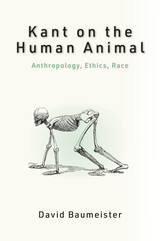
David Baumeister tracks four decades of Kant’s intellectual development, surveying works published in Kant’s lifetime along with posthumously published notes and student lecture transcripts. They show the crucial role that animality plays in many previously unconnected areas of Kant’s thought, such as his account of the human’s originally quadrupedal posture, his theory of early childhood development, and his conception of the process of human racial differentiation. Beginning with a delineation of Kant’s understanding of the commonalities and differences between humans and other animals, Baumeister focuses on the contribution of animality to Kant’s views of ethics, anthropology, human nature, and race.
Placing divergent features of Kant’s thought within a unified interpretive framework, Kant on the Human Animal reveals how, for Kant, becoming human requires that animality not be eclipsed and overcome but rather disciplined and developed. What emerges is a new appreciation of Kant’s human being as the human animal it is.
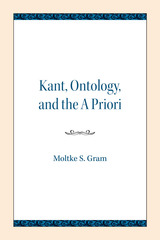
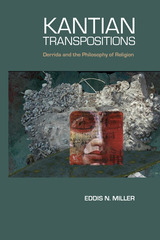
Kantian Transpositions presents an important new reading of Jacques Derrida’s writings on religion and ethics. Eddis Miller argues that Derrida’s late texts on religion constitute an interrogation of the meaning and possibility of a “philosophy of religion.” It is the first book to fully engage Derrida’s claim, in “Faith and Knowledge: The Two Sources of ‘Religion’ at the Limits of Reason Alone” to be transposing the Kantian gesture of thinking religion “within the limits of reason alone.”
Miller outlines the terms of this “transposition” and reads Derrida’s work as an attempt to enact such a transposition. Along the way, he stakes out new ground in the debate over deconstruction and ethics, showing—against recent interpretations of Derrida’s work—that there is an ethical moment in Derrida’s writings that cannot be understood properly without accounting for the decisive role played by Kant’s ethics. The result is the most sustained demonstration yet offered of Kant’s indispensible contribution to Derrida’s thought.
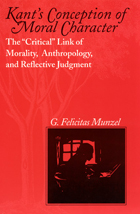
The first book to focus on character formation in Kant's moral philosophy, it builds on important recent work on Kant's aesthetics and anthropology, and brings these to bear on moral issues. Munzel traces Kant's multifaceted definition of character through the broad range of his writings, and then explores the structure of character, its actual exercise in the world, and its cultivation.
An outstanding work of original textual analysis and interpretation, Kant's Conception of Moral Character is a major contribution to Kant studies and moral philosophy in general.
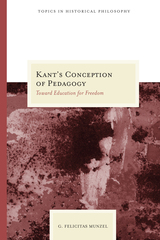
Although Kant was involved in the education debates of his time, it is widely held that in his mature philosophical writings he remained silent on the subject. In her groundbreaking Kant’s Conception of Pedagogy, G. Felicitas Munzel finds extant in Kant’s writings the so-called missing critical treatise on education. It appears in the Doctrines of Method with which he concludes each of his major works.
In it, Kant identifies the fundamental principles for the cultivation of reason’s judgment when it comes to cognition, beauty, nature, and the exercise of morality while subject to the passions and inclinations that characterize the human experience.
From her analysis, Munzel extrapolates principles for a cosmopolitan education that parallels the structure of Kant’s republican constitution for perpetual peace. With the formal principles in place, the argument concludes with a query of the material principles that would fulfill the formal conditions required for an education for freedom.
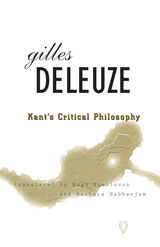

This is the first book in English devoted entirely to Kant’s Opus postumum and its place in the Kantian oeuvre. Over the last few decades, the importance of this text for our understanding of Kant’s philosophy has emerged with increasing clarity.
Although Kant began it in order to solve a relatively minor problem within his philosophy, his reflections soon forced him to readdress virtually all the key problems of his critical philosophy: the objective validity of the categories, the dynamical theory of matter, the natures of space and time, the refutation of idealism, the theory of the self and its agency, the question of living organisms, the doctrine of the practical postulates and the idea of God, the unity of theoretical and practical reason, and the idea of transcendental philosophy itself. In the end Kant was convinced that these problems, some of which had preoccupied him throughout his career, could finally be brought to a coherent and adequate solution and integrated into a single philosophical conception.
As Eckart Förster shows in his penetrating study, Kant’s conviction deserves not only our intellectual respect but also our undivided philosophical attention. Förster provides detailed analyses of the key problems of Kant’s Opus postumum and also relates them to Kant’s major published writings. In this way he provides unique insights into the extraordinary continuity and inner dynamics of Kant’s transcendental philosophy as it progresses toward its final synthesis.
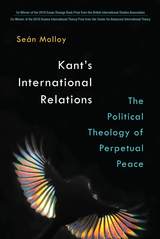

Kant’s revolution in methodology limited metaphysics to the conditions of possible experience. Since, following Hume, analysis—the “method of discovery” in early modern physics—could no longer ground itself in sense or in God’s constituting reason a new arché, “origin” and “principle,” was required, which Kant found in the synthesis of the productive imagination, the common root of sensibility and understanding. Charles Bigger argues that this imaginative “between” recapitulates the ancient Gaia myth which, as used by Plato in the Timaeus, offers a way into this originary arché. Since it depends on myth and the “likely story” rather than on a self-certain apprehension of Being, this facilitates an imaginative approach to the natural sciences which, through its synthetic a priori formations, can claim to be Kantian.
Bigger explores Kant’s ethics as an alternative to metaphysics that holds open the prospect of a Good beyond Being—and phenomenology—whose traces nevertheless appear in original synthesis. Though wary of its reductive implications, Bigger uses Derrida’s difference, a medial, feminine arché, as a way into this creative and procreative metaxu (between). As Emmanuel Levinas suggests, this is Plato’s gap [chaos] between being and becoming, whose possibility, beyond both, lies in chora and the Good. This Open also presents the possibility for a new, yet still Kantian, understanding of the formal and material conditions for the natural sciences.
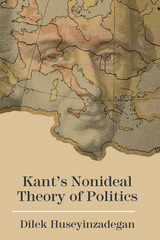
This novel analysis thus challenges the common assumption that an ideal theory of cosmopolitanism constitutes Kant’s sole political legacy. Dilek Huseyinzadegan demonstrates that Kant employs a teleological worldview throughout his political writings as a means of grappling with the pressing issues of multiplicity, diversity, and plurality—issues that confront us to this day.
Kant’s Nonideal Theory of Politics is the first book-length treatment of Kant’s political thought that gives full attention to the role that history, anthropology, and geography play in his mainstream political writings. Interweaving close textual analyses of Kant’s writings with more contemporary political frameworks, this book also makes Kant accessible and responsive to fields other than philosophy. As such, it will be of interest to students and scholars working at the intersections of political theory, feminism, critical race theory, and post- and decolonial thought.

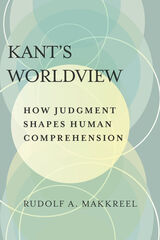
To comprehend, according to Kant, is to possess sufficient insight into situations so as to also achieve some purpose. This requires that reason be applied with the discernment that reflective judgment makes possible. Comprehension, practical as well as theoretical, can fill in Kant’s world concept and his sublime evocation of a Weltanschauung with a more down-to-earth worldview.
Scholars have recently stressed Kant’s impure ethics, his nonideal politics, and his pragmatism. Makkreel complements these efforts by using Kant’s ethical, sociopolitical, religious, and anthropological writings to provide a more encompassing account of the role of human beings in the world. The result is a major contribution to our understanding of Kant and the history of European philosophy.
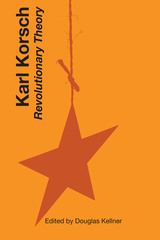
There is growing interest in Europe and the United States in the work of the major German social-political philosopher Karl Korsch. Korsch participated in the turbulent struggles in Weimar Germany and while in exile continually reflected on history and politics. His work affords one of the most important interpretations of the role of Marxism in twentieth-century revolutionary movements, while developing an ongoing critical interrogation of Marxism. His thought provides an illuminating perspective on the process of revolution and counterrevolution in recent history. Karl Korsch: Revolutionary Theory is the first English anthology of his most important writings.
This collection presents Korsch's essays on a wide range of subjects, including Marxism and socialization, Lenin and the Soviet Union, the crisis of Marxism, models of revolutionary practice, fascism and counterrevolution, and Korsch's final evaluation of Marxism. Much of this work is translated into English for the first time, and many unknown essays first published in radical journals which are no longer available appear here. The volume includes Korsch's major essays written during the 1920s and 1930s as well as some of his later work.
Douglas Kellner's detailed introduction, "Korsch's Revolutionary Marxism," contains the first comprehensive critical interpretation of Korsch's work to appear in English. It provides a historical-theoretical reconstruction of Korsch's life and thought and roots his political theory in the sociopolitical context in which it evolved. The introduction has been described by Korsch scholars as a "first-class piece of exposition and interpretation" and a "serious, first-rate contribution likely to preempt the field in the English language." The editor's introduction along with the representative selection of essays provide firm grounding in the ideas and historical significance of Karl Korsch.
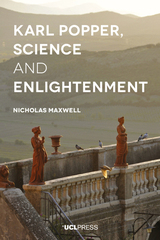
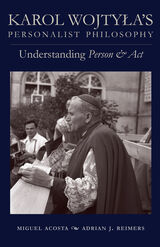

The human rights regime is one of modernity's great civilizing triumphs. From the formal promulgation of the Universal Declaration of Human Rights in 1948 to the subsequent embrace of this declaration by the newly independent states of Africa, human rights have emerged as the primary discourse of global politics and as an increasingly prominent category in the international and domestic legal system. But throughout their history, human rights have endured sustained attempts at disenfranchisement.
In this provocative study, Linda Hogan defends human rights language while simultaneously reenvisioning its future. Avoiding problematic claims about shared universal values, Hogan draws on the constructivist strand of political philosophy to argue for a three-pronged conception of human rights: as requirements for human flourishing, as necessary standards of human community, and as the basis for emancipatory politics. In the process, she shows that it is theoretically possible and politically necessary for theologians to keep faith with human rights. Indeed, the Christian tradition—the wellspring of many of the ethical commitments considered central to human rights—must embrace its vital role in the project.

“In the annals of American diplomacy, the presence of George F. Kennan stands tall and daunting, a figure of articulate intelligence who thought about the action but also beyond it. He was not always a great diplomat, for his imagination was lively, and he lacked the self-effacing patience which is so essential to the profession at its most mundane; but he was a great analyst and policymaker, one of the very few this country has produced in foreign affairs, perhaps finest since John Quincy Adams.”
Thus begins Anders Stephanson's penetrating study of this complicated, often controversial, yet highly respected public man. From an array of intellectual reference points, Stephanson has written what is not only the most serious assessment of Kennan to appear but is also a work of general significance for a wide range of contemporary issues in foreign and domestic politics and culture. Appropriately, the book's emphasis is on Kennan's lifelong attempt to grasp Soviet foreign policy and devise an effective American response, particularly during the decisive period around the Second World War when the contours of our present world order gradually emerged: the period of wartime alliance with the Soviet Union, the ensuing “containment” policies and division of Europe and much of the world into hostile blocs. Stephanson also examines Kennan's strategic vision, his “realistic” approach to foreign policy, and his disdain for the Third World.
An extended final section, “Class and Country,” then situates Kennan as an essentially European kind of “organicist” conservative with no obvious political home in American society, a society manifestly unorganic in all its mobility and mass culture. An outsider without class attachment, he could never reconcile his dislike of American politics and culture with his attachment to values of order and hierarchy. These warring sensibilities produced, for example, vehement denunciations of McCarthyism as well as of the student revolts of the following decade. Yet it was Kennan's marginality, his functional detachment from domestic politics, that made possible his often clairvoyant analyses of foreign affairs.
Stephanson's work is an unusually broad and deep characterization of a reflective, sometimes enigmatic but always outstanding American policymaker and man of letters.
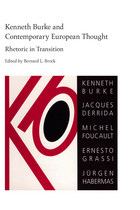
Kenneth Burke and Contemporary European Thought: A Rhetoric in Transition reflects the present transitional nature of rhetoric and society. Its purpose is to relate the rhetorical theory of Burke to the theories of four major European philosophers—Jürgen Habermas, Ernesto Grassi, Foucault, and Jacques Derrida—as they discuss the nature of language and its central role in society.
This book describes a rhetorical world in transition but not a world in chaos. It points to the centrality of symbolism in theories of language and rhetoric and illustrates Burke’s influence as a pivotal things and theorist in the communication arts and sciences, suggesting that the observations regarding shifting paradigms and perspectives made by other scholars are indeed emergent in the realm of rhetoric. It also regards the powerful impact of language and symbolic action in both the critique and construction of human knowledge and augurs a central role for rhetoric in the intellectual and social transformations of this and the next century.
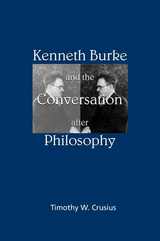
Throughout much of his long life (1897–1993), Kenneth Burke was recognized as a leading American intellectual, perhaps the most significant critic writing in English since Coleridge. From about 1950 on, rhetoricians in both English and speech began to see him as a major contributor to the New Rhetoric. But despite Burke's own claims to be writing philosophy and some notice from reviewers and critics that his work was philosophically significant, Timothy W. Crusius is the first to access his work as philosophy.
Crusius traces Burke's commitment and contributions to philosophy prior to 1945, from Counter-Statement (1931) through The Philosophy of Literary Form (1941). While Burke might have been a late modernist thinker, Crusius shows that Burke actually starts from a position closely akin to such postmodern figures as Michel Foucault and Richard Rorty.
Crusius then examines Burke's work from A Grammar of Motives (1945) up to his last published essays, drawing most heavily on A Rhetoric of Motives, The Rhetoric of Religion, and uncollected essays from the 1970s. This part concerns Burke's contributions to human activities always closely associated with rhetoric-hermeneutics, dialectic, and praxis. Burke's highly developed notion of our species as the "symbol-using animal," argues Crusius, draws together the various strands of his later philosophy—his concern with interpretation, with dialectic and dialogue, with a praxis devoted to awareness and control of the self-deceiving and potentially self-destructive motives inherent in language itself.
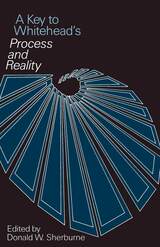
"The Key renders Process and Reality pedagogically accessible for the first time."—Journal of Religion

Daily political events and the steady inevitability of globalism require that informed students and citizens learn something about religious traditions foreign to their own. Designed for both classroom and general use, these handy Key Words guidebooks are essential resources for those who want clear and concise explanations of common terms and unfamiliar concepts of major world religions.
Each pocket-sized volume contains definitions for over 400 terms from religious principles and significant periods to noteworthy figures.
A quick sampling of terms from this volume:
BodhisattvaBhavanaJaramaranaKalachakraMalaMantraNirvanaSamadhiZen
Sample Definitions:
Brahma Viharas: The four sublime states of loving kindness, compassion, sympathetic joy, and evenness of mind achieved by the practice of bhavana (see bhavana, metta, karuna, mudita, upekkha).
Jaramarana: Old age and death. The final link in the causal chain of existence which arises from jati or birth. The Buddha left his palace to search for enlightenment after experiencing the shock of seeing old age, sickness and death (see jati, Siddharta Gotma,. nidanas, samsara).

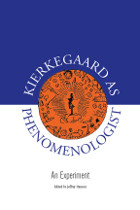
In Kierkegaard as Phenomenologist: An Experiment, Jeffrey Hanson embarks on a project to locate Kierkegaard within the current phenomenological discussion. This work is an experiment inasmuch as the plausibility of the undertaking itself will be determined only by the outcome. Some of the contributors clearly regard it as possible to read Kierkegaard as a phenomenologist. Others plainly do not and will contest the very hypothesis that forms the basis of this experiment.
As with any experiment, the larger discussion will determine its success, but Kierkegaard as Phenomenologist lays the groundwork for two exciting possibilities: first, that Kierkegaard scholarship will be renewed, and second, that the meaning of phenomenology itself will be reconsidered.
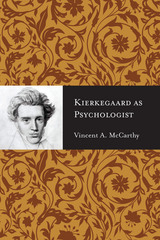
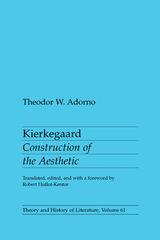
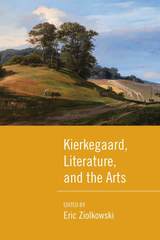
The essays in Kierkegaard, Literature, and the Arts, contextualized with an insightful introduction by Eric Ziolkowski, explore Kierkegaard’s relationship to literature (poetry, prose, and storytelling), the performing arts (theater, music, opera, and dance), and the visual arts, including film. The collection is rounded out with a comparative section that considers Kierkegaard in juxtaposition with a romantic poet (William Blake), a modern composer (Arnold Schoenberg), and a contemporary singer‑songwriter (Bob Dylan). Kierkegaard was as much an aesthetic thinker as a philosopher, and his philosophical writings are complemented by his literary and music criticism.
Kierkegaard, Literature, and the Arts will offer much of interest to scholars concerned with Kierkegaard as well as teachers, performers, and readers in the various aesthetic fields discussed.
CONTRIBUTORS: Christopher B. Barnett, Martijn Boven, Anne Margrete Fiskvik, Joakim Garff, Ronald M. Green, Peder Jothen, Ragni Linnet, Jamie A. Lorentzen, Edward F. Mooney, George Pattison, Nils Holger Petersen, Howard Pickett, Marcia C. Robinson, James Rovira
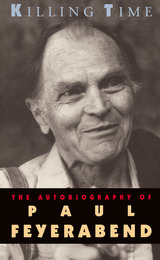
Trained in physics and astronomy, Feyerabend was best known as a philosopher of science. But he emphatically was not a builder of theories or a writer of rules. Rather, his fame was in powerful, plain-spoken critiques of "big" science and "big" philosophy. Feyerabend gave voice to a radically democratic "epistemological anarchism:" he argued forcefully that there is not one way to knowledge, but many principled paths; not one truth or one rationality but different, competing pictures of the workings of the world. "Anything goes," he said about the ways of science in his most famous book, Against Method. And he meant it.
Here, for the first time, Feyerabend traces the trajectory that led him from an isolated, lower-middle-class childhood in Vienna to the height of international academic success. He writes of his experience in the German army on the Russian front, where three bullets left him crippled, impotent, and in lifelong pain. He recalls his promising talent as an operatic tenor (a lifelong passion), his encounters with everyone from Martin Buber to Bertolt Brecht, innumerable love affairs, four marriages, and a career so rich he once held tenured positions at four universities at the same time.
Although not written as an intellectual autobiography, Killing Time sketches the people, ideas, and conflicts of sixty years. Feyerabend writes frankly of complicated relationships with his mentor Karl Popper and his friend and frequent opponent Imre Lakatos, and his reactions to a growing reputation as the "worst enemy of science."
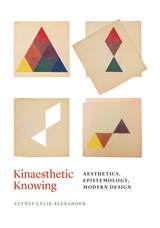
In this book, Alexander offers the first major intellectual history of kinaesthetic knowing and its influence on the formation of modern art and architecture and especially modern design education. Focusing in particular on Germany and tracing the story up to the start of World War II, Alexander reveals the tension between intellectual meditation and immediate experience to be at the heart of the modern discourse of aesthetics, playing a major part in the artistic and teaching practices of numerous key figures of the period, including Heinrich Wölfflin, Hermann Obrist, August Endell, László Moholy-Nagy, and many others. Ultimately, she shows, kinaesthetic knowing did not become the foundation of the human sciences, as some of its advocates had hoped, but it did lay the groundwork—at such institutions as the Bauhaus—for modern art and architecture in the twentieth century.
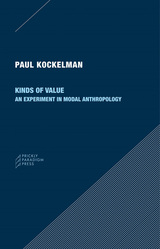

What happened to paradise after Adam and Eve were expelled? The question may sound like a theological quibble, or even a joke, but in The Kingdom and the Garden, Giorgio Agamben uses it as a starting point for an investigation of human nature and the prospects for political transformation. In a tour-de-force reinterpretation of the Christian tradition, Agamben shows that the Garden of Eden has always served as a symbol of humanity’s true nature. Where earlier theologians viewed the expulsion as temporary, Augustine’s doctrine of original sin makes it permanent, reimagining humanity as the paradoxical creature that has been completely alienated from its own nature. From this perspective, there can be no return to paradise, only the hope for the messianic kingdom. Yet there have always been thinkers who rebelled against this idea, and Agamben highlights two major examples. The first is the early medieval philosopher John Scotus Eriugena, who argued for a radical unity of humanity with all living things. The second is Dante, whose vision of the earthly paradise points towards the possibility of genuine human happiness in this world. In place of the messianic kingdom, which has provided the model for modern revolutionary movements, Agamben contends that we should place our hopes for political change in a return to our origins, by reclaiming the earthly paradise.
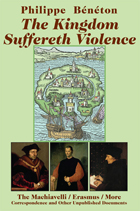
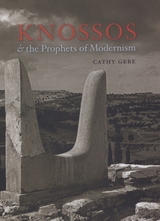
In the spring of 1900, British archaeologist Arthur Evans began to excavate the palace of Knossos on Crete, bringing ancient Greek legends to life just as a new century dawned amid far-reaching questions about human history, art, and culture. With Knossos and the Prophets of Modernism, Cathy Gere relates the fascinating story of Evans’s excavation and its long-term effects on Western culture. After the World War I left the Enlightenment dream in tatters, the lost paradise that Evans offered in the concrete labyrinth—pacifist and matriarchal, pagan and cosmic—seemed to offer a new way forward for writers, artists, and thinkers such as Sigmund Freud, James Joyce, Giorgio de Chirico, Robert Graves, and Hilda Doolittle.
Assembling a brilliant, talented, and eccentric cast at a moment of tremendous intellectual vitality and wrenching change, Cathy Gere paints an unforgettable portrait of the age of concrete and the birth of modernism.
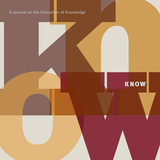
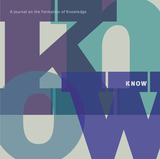
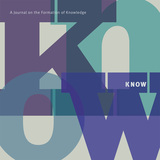
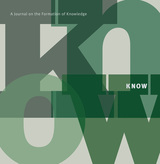
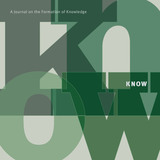
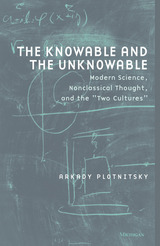
Plotnitsky highlights those points at which the known gives way to the unknown (and unknowable). These points are significant, he argues, because they push the boundaries of thought and challenge the boundaries of disciplinarity. One of the book's most interesting observations is that key figures in science, in order to push toward a framing of the unknown, actually retreated into a conservative disciplinarity. Plotnitsky's informed, interdisciplinary approach is more productive than the disparaging attacks on postmodernism or scientism that have hitherto characterized this discourse.
Arkady Plotnitsky is Professor of English and Director, Theory and Cultural Studies Program, Purdue University. Trained in both mathematics and literary theory, he is author of several books, including In the Shadow of Hegel: Complementarity, History and the Unconscious and Reconfigurations: Critical Theory and General Economy.
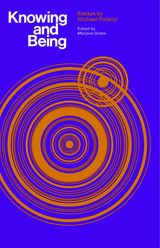
This collection of essays, assembled by Marjorie Grene, exemplifies the development of Polanyi's theory of knowledge which was first presented in Science, Faith, and Society and later systematized in Personal Knowledge.
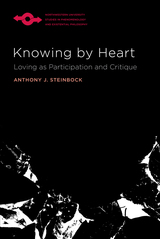
Knowing by Heart describes the movement of loving as a participation that bears on all beings. Eschewing the dichotomy of rationalism and sensibility that has dominated discussions of love and emotion, Steinbock understands the heart as a vast schema ranging from the deepest loving to affects and felt conditions. The book brings into focus the importance of a full‑bodied relational account of a normative critique based in emotion. From a phenomenological description of diverse feelings to the normativity of loving as the discernment of the heart, this work evaluates hating’s relation to loving. At the basis of all this is a phenomenological and philosophical anthropology in response to the basic question: In reality, who and what are we?
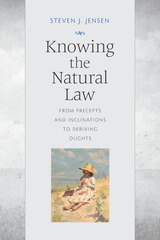
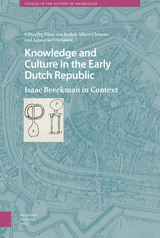
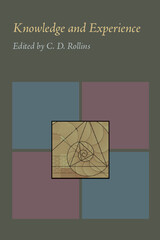
Contributors include: Hector-Neri Castañeda, Newton Garver, Arthur N. Prior, John R. Searle, G. J. Warnock, with commentary by Paul Benacerraf, V. C. Chappell, Carl Ginet, F. A. Siegler, James F. Thomson, Zeno Vendler, and Paul Ziff.
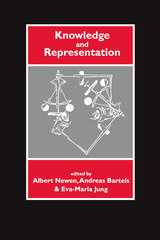
This compilation of cutting-edge philosophical and scientific research comprises a survey of recent neuroscientific research on representational systems in animals and humans. Representational systems provide their owners with useful information about their environment and are shaped by the special informational needs of the organism with respect to its environment. In this volume, the authors address the long-standing dispute about the usefulness of the notion of representation in the study of behavior systems and offer a fresh perspective on representational systems that combines philosophical insights and experimental experience.
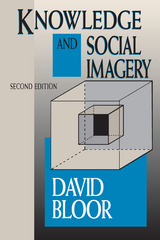
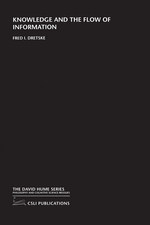
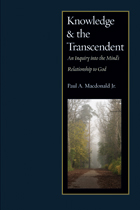
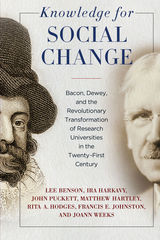
Employing history, social theory, and a detailed contemporary case study, Knowledge for Social Change argues for fundamentally reshaping research universities to function as democratic, civic, and community-engaged institutions dedicated to advancing learning and knowledge for social change. The authors focus on significant contributions to learning made by Francis Bacon, Benjamin Franklin, Seth Low, Jane Addams, William Rainey Harper, and John Dewey—as well as their own work at Penn’s Netter Center for Community Partnerships—to help create and sustain democratically-engaged colleges and universities for the public good.
Knowledge for Social Change highlights university-assisted community schools to effect a thoroughgoing change of research universities that will contribute to more democratic schools, communities, and societies. The authors also call on democratic-minded academics to create and sustain a global movement dedicated to advancing learning for the “relief of man’s estate”—an iconic phrase by Francis Bacon that emphasized the continued betterment of the human condition—and to realize Dewey’s vision of an organic “Great Community” composed of participatory, democratic, collaborative, and interdependent societies.

In the first part of the twentieth century, Korean Buddhists, despite living under colonial rule, reconfigured sacred objects, festivals, urban temples, propagation—and even their own identities—to modernize and elevate Korean Buddhism. By focusing on six case studies, this book highlights the centrality of transnational relationships in the transformation of colonial Korean Buddhism.
Hwansoo Ilmee Kim examines how Korean, Japanese, and other Buddhists operating in colonial Korea, Japan, China, Taiwan, Manchuria, and beyond participated in and were significantly influenced by transnational forces, even as Buddhists of Korea and other parts of Asia were motivated by nationalist and sectarian interests. More broadly, the cases explored in the The Korean Buddhist Empire reveal that, while Japanese Buddhism exerted the most influence, Korean Buddhism was (as Japanese Buddhism was itself) deeply influenced by developments in China, Taiwan, Sri Lanka, Europe, and the United States, as well as by Christianity.
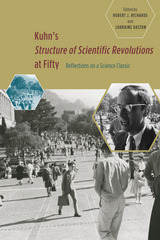
In Kuhn’s “Structure of Scientific Revolutions” at Fifty, leading social scientists and philosophers explore the origins of Kuhn’s masterwork and its legacy fifty years on. These essays exhume important historical context for Kuhn’s work, critically analyzing its foundations in twentieth-century science, politics, and Kuhn’s own intellectual biography: his experiences as a physics graduate student, his close relationship with psychologists before and after the publication of Structure, and the Cold War framework of terms such as “world view” and “paradigm.”
READERS
Browse our collection.
PUBLISHERS
See BiblioVault's publisher services.
STUDENT SERVICES
Files for college accessibility offices.
UChicago Accessibility Resources
home | accessibility | search | about | contact us
BiblioVault ® 2001 - 2024
The University of Chicago Press









